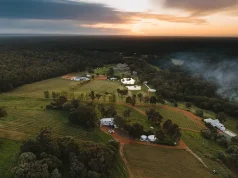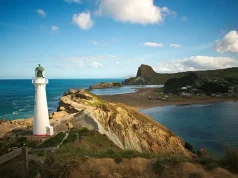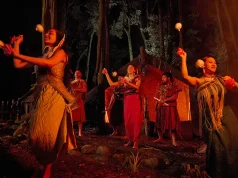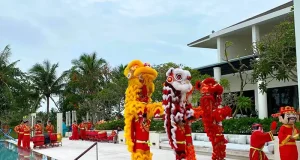When making a move from New York City to Perth, Western Australia, you have to realize what you’re getting yourself into. You stopped going to bed at 4 am because the party was too good to leave. Instead, you’re waking up at 4 am because scuba diving is too good to sleep. Shifting gears from nightlife to ocean life was exactly what I was craving with a move around the world.
Exploring Western Australia’s ocean is like exploring another planet. I couldn’t believe how much lived below the Indian Ocean waterline. The most notable: are the whales. Little did I know, Western Australia is home to nine species of whales (that we know of at least). This includes the Humpback, Southern Right, Blue, Bryde’s, Minke, Sei, Fin, Pygmy Sperm, and the infamous Orca Whale. Not all of these species are easy to spot, but some of them put on quite the show if you’re lucky to get up close and personal. The orcas are one of them.
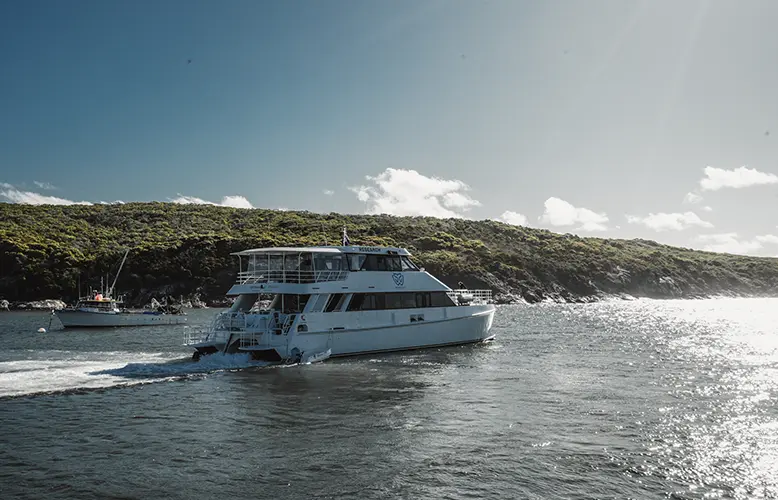
When researching my new home, I stumbled upon a place called Bremer Bay. And when I started to ask Perth locals about this magical place, not many knew about it. This was shocking, given its draw and appeal was its proximity to a dense population of orcas. Very quickly, Bremer Bay became the number one place I wanted to experience.
It wasn’t until the Edges of Earth expedition that I reached out to Gemma Sharp—the co-owner of Whale Watch Western Australia, which is one of the elite whale-watching operations in the country. I told her about my four-year-long burning desire to come to see Bremer Bay up close and personal. With an invite to join her and her family on one of her many voyages to interact with orcas, we started mapping out our route from Perth to the middle of nowhere. Epic!
We sprinted, completing the 7-hour route from Perth to Bremer Bay in a single day. This included navigating through some of the most beautiful Australian scenery, including the rolling hills and major forests of the Great Southern region. Vast, sprawling, and empty, this drive is certainly part of the allure of making the trek to a town with a permanent population of 300 people. This place is surely WA’s best-kept secret. Making it to Bremer Bay town is one thing. It’s another to make it out in one piece to Bremer Bay Canyon—the main event.
The Bremer Canyon is a submarine canyon located 60 kilometers south of the town. It is one of the largest and most biodiverse marine canyons in the world, with a depth of up to 3,500 meters and an area of around 6,000 square kilometers. The canyon is renowned for its remarkable biodiversity, which includes a large variety of marine species, some of which are found nowhere else in the world.
It’s home to one of the most unique pods of orcas that gather in large numbers during the summer months to feed on the abundant deep-sea squid. Most global orca populations feed on fish and other marine mammals, not squid. Why is this special? Seeing a giant squid is extremely rare, as they live in the depths. They thrive in the mesopelagic and bathypelagic zones of the ocean, which can range from 200 meters (656 feet) to over 1,000 meters (3,280 feet) deep. So when you’re on a whale watching tour and you get to see giant squid in the mouth of an orca, THAT’S special, if you ask me.
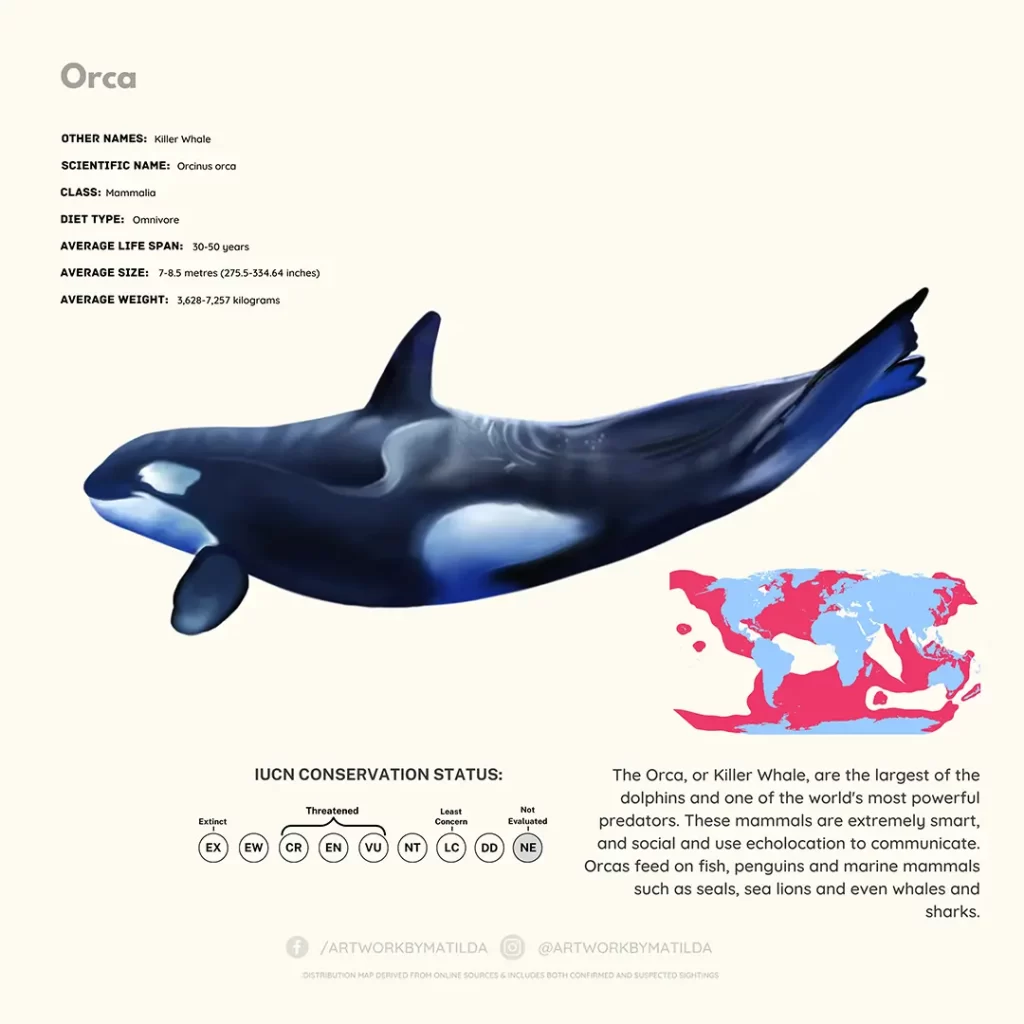
There are only a few ways to explore The Bremer Canyon—get your own boat or participate in a whale-watching tour. Enter Gemma and her family.
Gemma was homeschooled, traveling around the most remote parts of Western Australia throughout her life. Coming from a long line of ocean stewards, Gemma grew up literally on the water. Because of their love of cetaceans and protecting the Western Australian coastline, the Sharp family created Whale Watch Western Australia. Their mission: bring people closer to whales in the most sustainable way possible and educate them on their importance. In the south, the family of four is out on the water every single day observing the Bremer Bay Canyon orca pod that consists of up to 20 individuals. Needless to say, the Sharps are certified whale experts and the ocean is in their DNA.
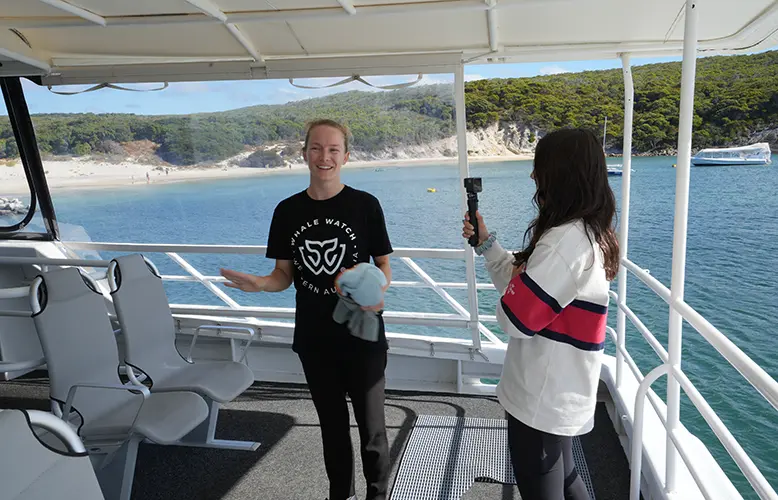
Gemma was a walking whale encyclopedia. That’s probably why BBC has tried to poach her multiple times to consult for them. Dedicated to Bremer Bay orcas, Gemma is more interested in sharing her knowledge directly from this spectacular edge of earth. And that’s exactly what she did with us. Our first meeting was the day before our tour, and Gemma gave us an in-depth breakdown of everything we’d need to know about going out on the canyon, why these whales in particular are so special, and what her family is doing to protect them.
The Sharp family has helped to establish “rules & regulations” alongside the Australian government on how to safely and properly take people out on the water to experience whales. Their entire operation is run under the premise that they are setting standards in whale eco-tourism that can be brought around the world to other regions. Basically, the Sharp family has established the gold standard for whale watching not only in Australia but globally.
Because of these rules & regulations, this orca pod is thriving, healthy and continuously coming back to this location year after year from January to April. During orca off-season, the Sharp family is moving up and down the coast of WA, bringing people close to other species of whales, including blue and humpbacks. Always on the move, this team is ensuring that the broad whale population in WA is tracked, understood and followed in appropriate ways so more people can experience their wonder for generations to come.
As we set out to sea for our tour, I have to say, I’ve never seen so many people seasick—myself shockingly not included. Seasickness runs in MY DNA! But spending so much time learning how to avoid it saved me, big time. Getting out to the canyon is not for the faint of heart. The conditions are more often raw, wild and exactly what you have in your mind when you think about life on the edges of the earth. Gemma warned me about this. While most were sunken into their seats, I was on deck, looking out to the most incredible ocean I’d ever set sail on, scouring for these special orcas.

Gemma was spotting the orcas and calling them by name from kilometers away, sharing facts about each one over the boat’s sound system. She knew their every move, as if she were good friends with the pod. I couldn’t believe how she was predicting all their behavior, as if she’d seen it 1,000 times before. That’s when it really sunk in: experience beats all.
We’ve been told you have to be a trained scientist to be an ocean expert. You need to go to college, get a masters or PHD, write a thesis, all those things. For the longest time, the ocean was reserved for those who followed the set-standard rules of academia. Meeting Gemma was proof that the best experience you’re going to have is actually living it. A classroom can’t replace being out on the ocean every single day (not to mention your whole life.) Today, to do the thing you love, you don’t have to follow any playbook. You just have to get out there and start fully and truly living it.
Operators that embed values of ecotourism into the entire experience are hard to come by. When you find them, you celebrate them and support them. It’s important that people get to witness the marvels of nature, but there’s a right way and a wrong way to do it. We need to remain as passive observers and know the limits when it comes to wildlife. Gemma heavily emphasized that point throughout our time together. Something I’ll take away as we continue on our adventures to all corners of the world.

I was fortunate to get the chance to see quite a few orcas in their natural habitat, in one of the most remote parts of the world. We took our time making our way back to Perth, stopping at some of Western Australia’s greatest hits—such as the towns of Walpole, Albany, Margaret River and Dunsborough. Reminiscing on what it was like to live in one of the most populated islands in the world, I couldn’t help but marvel at the contrast of my new home over the last four years. This was the first time it truly sunk in that I have been truly living on the edges of the earth.
(Boranup Forest, on the road from Bremer Bay to Perth. Photo Credit: Jeff Wilson, The Wander Studio.)
Expedition stop number one set the tone for what the next two years were going to look like for our team. There was no better place to kick off an adventure of a lifetime than Bremer Bay. And no better people to do it with than the legendary Sharps.
Andi Cross is a growth strategist, divemaster, founder of impact consultancy WILDPALM, and lead of the Edges of Earth expedition, highlighting stories of remote ocean conservation communities and organizations in 50 destinations worldwide. To keep up with the expedition and see where the team is going next, follow the team on Instagram, LinkedIn, TikTok, YouTube, and their website.
As a family-owned and operated business, Whale Watch Western Australia works with remarkable species including orca, blue, humpback, and southern right whales. Onboard research programs include photo identification, body condition studies, migratory path recordings, and behavioral observation studies—as well as best practices in ecotourism


